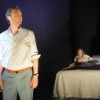Originally published by L.S. Media. June 2nd 2012.
L.S. Media Rating *****
Cast: John Simm, Colin Tierney, Ruth Gemmell, Thomas Tinker.
There’s a lot of media baggage that gets dragged along whenever a new production of the late Harold Pinter gets a much needed run on a tour. The fact that Pinter’s work can rouse so much passion and enjoyment in almost every line, even when some of the audience can be audibly heard afterwards that they didn’t get what the play was about, just adds to the mystique and power of the man’s writing as everyone decided to dissect each and every line.
The Crucible Theatre in Sheffield, home for many years to the World Snooker Championship, is celebrating its 40th birthday this year and in the best traditions of birthdays, it has gone back to where it started and brought back one of Harold Pinter’s most enjoyable and remarkable plays in Betrayal.
If that wasn’t enough for the audiences who no doubt have flocked to the theatre in droves so far this year, then by having one of the most bankable and notable actors of his time, John Simm within the cast will surely have the crowds salivating at the prospect. That’s not to say that he carries this play, as each of the four actors, John Simm, Colin Tierney, the delightful Ruth Gemmell and Thomas Tinker, who was making his Crucible debut, gave performances that were above and beyond the call of the occasion.
The play deals with the idea of betrayal and infidelity within marriage and also can be seen as the betrayal of expectations from an audience’s point of view. With the time shifting between dates and years as the story unfolds in a rather unnerving way of showing the aftermath first before rolling back the years to when Emma and Jerry first met and the first kiss made.
The stage was one of the most interesting and incredible that it has been my personal pleasure to witness, even with the stark and almost unforgiving nature of the set having the very barest of furniture, the stage was never bare, it acted as if it was a fifth member of the cast as time went forward and backwards, it revolved and span as if the mechanism of speeding clock had been placed on the stage and the actors themselves becoming the hands of the clock, ticking away at the time bomb that had come between the three friends and betrayers.
Nick Bagnall must be congratulated for his direction of the cast, as the play hinged completely on the reactions and subtle pregnant pauses that Pinter weaved in his work with great effect and which Nick Bagnall utilised with great care and much love.
Betrayal is simply and utterly brilliant.
Ian D. Hall

